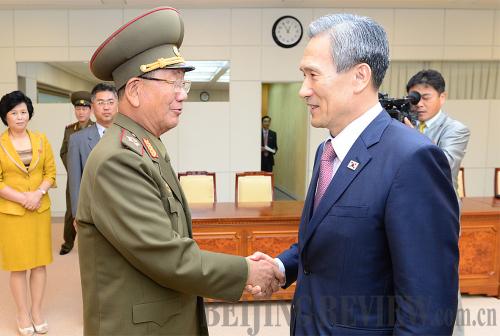|
 |
|
Hwang Pyong So (left), Director of the General Political Bureau of the Korean People's Army of North Korea, shakes hands with Kim Kwan Jin, chief of South Korea's National Security Office, after their talks at the Panmunjom truce village on August 25 (XINHUA) |

Relations of the two Koreas have experienced somewhat of a roller coaster ride over the past month. Fortunately, tensions eased following a high-level dialogue that engendered mutual compromises. However, both Seoul and Pyongyang have learned a salient lesson that a high-level communication channel is necessary and critical for the stability of the Korean Peninsula.
The latest escalation of tension originated from claims by South Korea in early August that its soldiers were wounded by landmines planted by North Korea along the border between the two countries. The North denied the accusation.
Seoul then ordered a series of retaliations, including blasting anti-Pyongyang propaganda from loudspeakers along the border, a tactic that both sides had agreed to bring to a halt in 2004. This move has greatly enraged Pyongyang, which then made an ultimatum that Seoul would either halt the broadcasts within 48 hours or face military action. The South held firm, demanding an apology for the explosion of the mines and its shelling attacks.
Fortunately, the two sides put an end to the rising tension after a marathon 43 hours of dialogue and reached a six-point agreement.
Much like the previous crises on the peninsula, after both sides' playing chicken and making full use of brinkmanship tactics, tensions were temporarily eased. Though such disagreements have an undeniable air of theatrics about them, the consequences that would ensue by one side misreading the other could be catastrophic, both for the international community and the two parties directly involved.
The two Koreas have actually remained in a state of war since the 1950-53 Korean War ended in a truce, not in a peace treaty. Though the two have declared time and again their intentions to improve bilateral relations, little headway has been made in this regard. Inter-Korean relations have been all but frozen since the 2010 sinking of a South Korean warship killing 46 sailors that Seoul blames on Pyongyang, though the latter denies culpability.
Generally speaking, senior observers of Korean Peninsula affairs universally believed that the ups and downs of inter-Korean relations have their roots in the two sides' inherent distrust of one another.
Given the proverbial relations on the Korean Peninsula, no third party can give a definite answer to the real cause underlying the latest crisis. But it is widely believed that Pyongyang's sense of insecurity is on the rise owing to the evolution of international situation, which has introduced elements of instability to the peninsula.
With the widening of the gap in international status between Seoul and Pyongyang, as well as the former's flexible foreign policy in the global arena and its active reunification policy, Pyongyang's international isolation becomes all the more conspicuous. Meanwhile the frequently-staged U.S.-South Korean military drills have only contributed to Pyongyang's unease. It is worth noting that the latest peninsula crisis came just ahead of the U.S.-South Korean Exercise Ulchi Freedom Guardian, which is aimed at the so-called North Korean security threat. All the things served to deepen misunderstandings and with no effective communication channel directly linking the two, tensions only elevated.
Luckily, the latest high-level dialogue has not only put the brakes on any potential conflict, but also helped the two sides institutionalize their bilateral talks. Under the six-point agreement reached, both sides agreed to hold an inter-governmental dialogue in Seoul or Pyongyang at the earliest possible date to improve ties and to proceed with talks and negotiations in various areas. The Korea JoongAng Daily quoted one high-ranking official from the South Korean Presidential Office as saying that the inter-Korean relation has entered a new era. The official also stressed that regular North-South talks will soon be established. This is not without precedent. In fact, there were regular dialogue mechanisms during the era of former South Korean President Roh Mu Hyun, but this ground to a halt during the Lee Myung Bak era.
Considering both history and the current situation, it would be unrealistic to expect the two sides to forgo their deep-rooted suspicions of each other anytime in the near future. However, only when normal communication channels are resumed can both sides establish mutual trust to narrow differences and avoid conflicts.
Not long after the new agreement was reached, South Korean President Park Geun Hye expressed hopes that the two countries could resolve all issues based on inter-Korean trust. North Korea's Hwang Pyong So, Director of the General Political Bureau of the Korean People's Army, also stated that it is fortunate that a fresh atmosphere for jointly improving north-south relations has been fostered.
As both sides agreed that the settlement of the latest crisis represents a fresh start, the issues concerning how to avoid the repeat of the same incident, how to foster mutual trust and reach greater consensus now should be placed firmly on agenda by both sides.
Copyedited by Eric Daly
Comments to yulintao@bjreview.com | 